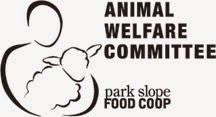by Kama Einhorn, Animal Welfare Committee You may have noticed a "certified humane" logo on some coop meats—but only a few. Why are there plenty of small, local family farmers raising animals well, but so few humane-certified items available in the coop—or in any store or restaurant? Here’s the four-part problem: All farmers must use USDA-approved slaughterhouses. Farmers cannot legally sell meat unless it’s been “harvested” at an approved “processing plant” (otherwise, they can only eat it themselves or give it away). Obviously, it’s crucial for a government agency to ensure that disease is kept out of the public food supply, but the USDA is a bloated bureaucracy whose rules favor factory farms (with fast “line speeds,” which is poor for humane slaughter) and help them to thrive. And factory farms are responsible for E. coli, Salmonella outbreaks and mad cow disease (the USDA lets factory farms feed dead, diseased cows to living cows). Small farmers are limited

